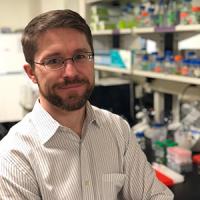
Stephen Benkovic, Evan Pugh University Professor and Holder of the Eberly Family Chair in Chemistry, has been elected a Foreign Member of the Royal Society, the national academy of science in the United Kingdom. Benkovic was elected for his pioneering work in bioorganic chemistry, which has impacted our understanding of how proteins function as catalysts.

Maria del Carmen Carmona Benitez, assistant professor of physics, has been honored with a 2021 Alfred P. Sloan Research Fellowship, which supports fundamental research by promising early career scientists. Carmona is a particle astrophysicist who studies dark matter and is an expert on detector hardware and operations, cryogenics, calibrations, data analysis, and Monte Carlo simulations.

Joseph Cotruvo Jr., Louis Martarano Career Development Professor of Chemistry, has been honored with a 2021 Alfred P. Sloan Research Fellowship, which supports fundamental research by early promising career scientists. Cotruvo studies how proteins—including the protein lanmodulin, which his group recently discovered and named—can be harnessed to detect rare earth metals in the environment and to separate them from other metals and from one another.

Elizabeth Elacqua, assistant professor of chemistry, has been awarded a 2021 Alfred P. Sloan Research Fellowship, which supports fundamental research by promising early career scientists. She was also honored with a Faculty Early Career Development (CAREER) award from the National Science Foundation in recognition of her work to create polymer-based “nanoreactors”—simplified models of nature’s polymers, whose precise shapes and nanosizes enable chemical reactions to take place in small, confined areas in an efficient manner.

Jainendra Jain, Evan Pugh University Professor and Erwin W. Mueller Professor of Physics, has been elected as a member of the National Academy of Sciences. Jain uses theoretical approaches to understanding the unexpected emergent behaviors of strongly interacting quantum many body systems, especially in low dimensions.

Kenneth Knappenberger, professor of chemistry, has been named a Fellow of the American Association for the Advancement of Science, the world's largest general scientific society and the publisher of the journal Science. He was recognized for his contributions to the understanding of the electronic and optical properties of metal nanostructures through the use of ultrafast spectroscopy.

Shaun Mahony, assistant professor of biochemistry and molecular biology, has been honored with a Faculty Early Career Development (CAREER) award from the National Science Foundation. The award will support Mahony’s research to develop machine learning methods to predict where transcription factors—proteins that control gene expression—bind to the genome.

Peter Mészáros, Eberly Chair Professor Emeritus of Astronomy and Astrophysics, has been elected as a member of the National Academy of Sciences. Mészáros is a theoretical astrophysicist who studies gamma-ray bursts, neutrino astrophysics, cosmology, cosmic rays, gravitational waves, and neutron stars.

Katsuhiko Murakami, professor of biochemistry and molecular biology, has been named a Fellow of the American Association for the Advancement of Science, the world's largest general scientific society and the publisher of the journal Science. He was recognized for outstanding contributions in the field of structural biology, particularly in examining the role of RNA

Mikael Rechtsman, Downsbrough Early Career Development Professor of Physics, and coinvestigator Randall McEntaffer, professor of astronomy and astrophysics, have been awarded a New Initiative grant from the Kaufman Foundation. The grant will support their project titled “Magnetizing light: from X-ray astronomy to silicon photonics,” which explores methods for making photon light particles “feel” magnetic fields.

Stephanie Wissel, assistant professor of physics and of astronomy and astrophysics, and her collaborators have been selected for the new NASA Pioneers program, which provides opportunities for early-to-mid-career researchers to lead space or suborbital science investigations for the first time. The Payload for Ultrahigh Energy Observation (PEUE) balloon mission is designed to launch from Antarctica and detect signals from energetic neutrinos, particles that contain valuable clues about distant astrophysical processes, including the origin of the most-energetic cosmic rays in the universe.

Lingzhou Xue, associate professor of statistics, has been selected as one of the inaugural members of the Committee of Presidents of Statistical Societies (COPSS) Leadership Academy, where he will have the opportunity to share his vision for the field with the academy and the statistical community. Xue was selected for “his innovative contributions to the theory and methodology of high-dimensional statistics and statistical learning, and for his outstanding and prolific service to the profession and to society.”

Lauren Zarzar, assistant professor of chemistry, has been honored with a Faculty Early Career Development (CAREER) award from the National Science Foundation. The award will support Zarzar’s research to develop additive manufacturing—3D printing—methods at the microscale, using compositions of mixed materials. She also received a New Initiative grant from the Kaufman Foundation. She is coinvestigator on the supported project, which aims to quantify communication and propulsion of active chemical droplets that seem to exhibit dynamics traditionally associated with flocks of birds or bacterial colonies.
